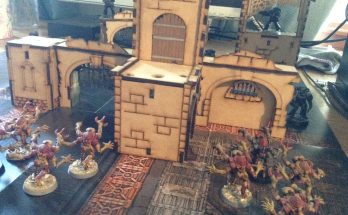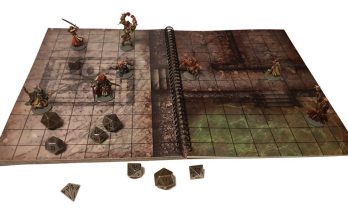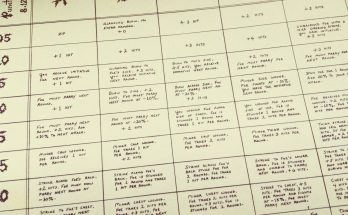I’m looking at Fourth Edition D&D through the lens of a years’ worth of gaming experience with a critical eye on what it needed to do and what it’s done. This is a long-term test review spread over several posts covering both the theoretical and practical sides of 4e D&D. Welcome to Part Four.
Here’s parts One, Two and Three.
This time around we’re looking at the Powers system. This is arguably the single biggest change 4e wrought on the D&D world, and it’s also the most contentious. One of the first complaints my players had against 4e D&D was that the Powers system felt too generic. And y’know what – they’re wrong. Or, more accurately – it’s the way that we think about the Powers system which is wrong.
Let me explain.
Imagine, if you will, a GM sat around a table with a couple of players. It’s the start of a new campaign and the conversation goes something like this…
GM: “Bob, tell me about your character.”
Bob: “He’s Argul the Class. He’s a Race, and he’s armed with a Weapon and is wearing Armour.”
GM: ” Oooo-kay……. Sally, what about you?”
Sally: “Maxx the Class. She’s a Race and she’s got a Weapon and is clad in Armour.”
GM: “Damn this system! It’s too generic!”
That’s pretty much what happens with the Powers system. “Powers” is a collective term meaning (roughly speaking) “Those special things you can do in combat” but we end up over-using the word. Rather than talk about a Wizard’s Spells, a Fighter’s Exploits or a Cleric’s Prayers, we just group ’em all together and call them Powers regardless of style, source or flavour.
That’s like calling all weapons…. well, just Weapons then arguing that all the weapons are the same – they just to damage. Or that all Armour is the same – it’s just got an Armour Class! I don’t see many folks complaining that a Short Sword is the same as a Short Bow – the only difference is one is ranged and the other isn’t. Instead, we think of the thing, of the way it looks and how it fits into the character concept. Just as a Fighter with a Greatsword conjours up a very different mental image to a Knife Fighting Rogue, so should a Fighter using the Victorious Surge Exploit compared to a Wizard casting a Fireball Spell.
When it comes to role-playing, the mechanical similarities are irrelevent. They exist purely so that that rules are consistent and help keep the game running smoothly. A player can pick any class and know (minor tweaks aside) how to play them without having to learn a whole chunk of class specific rules. In some ways I’ll admit I miss that about the game. I loved the hinky classes of yore which their own special ways of Doing Stuff. My all-time favourite 3e class was the Binder, for example. I’d love to see 4e come out with some really off the wall classes which don’t use the Powers system at all, but that’s just me.
So here’s my challenge to you. Stop using the word “Power” at all in your game. Make the effort to use the specific term for each class’s abilities and you’ll soon find that what was once generic (‘cos you were using the generic term) will feel special again. Give it a try. Go on. You’ll be surprised at what a difference it makes.
Next: More about Powers.




I’m really enjoying this series you’ve got going on.
I’ve found that the power system is very maleable, giving you the ability to mix it up and have a very unique character based on the powers you use. A Fighter with a sword and shield using the shield powers to enhance the concept, whereas a great-sword fighter feels quite different. Seeing those two types of fighters at the table without knowing they were both fighters, you would assume they were different classes.
.-= Dice Monkey´s last blog ..Traveller: Where to begin? =-.
One thing that I think gets a lot of people is that powers = combat stuff. And some of the names are kind of silly.
But powers can be reskinned any way you want — ultimately, as long as the mechanics stay the same, the balance is the same.
And you can also use powers outside of combat. Not following the game mechanics, per se, but using your imagination they can do some neat things. E.g., take the rogue at-will attack Sly Flourish. The very brief flavor text screams to me that this rogue is good at knife tricks. So perhaps juggling, twirling, the Bishop’s knife trick from Alien, could all be part of this power. The wizard’s ray of frost could become an instant drink chiller, while scorching burst could start campfires (or forest fires).
Of course you want to be careful how you allow your players to use the powers, but letting them be used outside of combat to add a little color and fun to the game is only a positive thing, IMO.
I couldn’t agree more that most people (well, at least the 4E haters) misundestand the powers. But I believe it’s mostly because of the name: people read “powers” and think about super heroes, anime characters, electronic rpg’s artificial melee powers.
Exploits are the least understood of all. People fail to see that they are the same as old feats like Whirlwind Attack and Shield Bash.
However, there are disadvantages of the system. One of them is repetition: as powers don’t scale the way spells did (1d6/level), there is plenty of powers that are just high-level versions of one same thing. And they are too bound to class, so you also have repeat amongst classes. A side effect of repetition is bad naming.
Other disadvantage is that most powers are made mostly for combat, even if they could be used in other ways. I miss the time when illusion spells said what you could create instead of how much psychic damage it does.
I think part of the reason things start looking the same is because it’s hard to conceptualize the different powers. We know that a dagger and a great sword look different and lead to different fighting styles that define a character. But to say “This rogue can stab you while he moves around (shifts)” and “This rogue can stab you while pushing you away” doesn’t really seem all that different because they are two simple fighting maneuvers, neither of which define a character. As Elda King noted, many of the powers are just “you stab better” powers, which again makes them feel rather similar and superficial.
Flavor text goes pretty far with concrete, visual stuff like weapons, but not as far for abstract stuff. Luke Skywalker using a lightsaber to slash someone is different than Conan slashing someone with his sword, even if they do it in the same manner. But give them both the same weapon and it’s pretty much the same, even though Luke is using the Force and Conan is using his barbarian awesomeness (and even if it lets them slash differently).
So maybe that’s the root cause. Weapons and spells feel different because they visually look different. But combat maneuvers are more abstract and imprecise, so it’s hard to visualize them and they look the same. Even “I cast the green spell, then the red spell” feels more flavorfully different than “I slash him right to left, then left to right.”
That’s kind of Greywulf’s point, though. Spells feel different because of convention. But there is plenty of repetition there. Monster Summoning I-IX, Cure x Wounds, Fireball/Delayed Blast Fireball/Meteor Swarm, Lightning/Chain Lightning, etc.
When compared with what came before, “I attack with a flourish” and “I give a great big overhand swing” are miles more specific than “I 5′ step and full attack, again, just like the last 10 rounds”.
Something you don’t hear in 1e but could if you apply the same ruler:
“I attack with my broadsword”
“Again? That’s all you ever do!”
There’s a huge difference between a Tide of Iron and a Cleave. The point is that there’s little difference between Brute Strike (Fighter Daily 1), Hack’n’Slash (Fighter Encounter 23) and No Mercy (Fighter Daily 29). Or a Sure Strike (Fighter At-Will) and a Careful Attack (Ranger At-Will).
And even among spells, Scorching Burst, Fireball, Fire Burst, Combust… all are simply bursts of fire, with different intensities.
Actually, Elda, what you are describing takes all the fun out of D&D. Well, half the fun. :)
.-= Elton´s last blog ..Introduction to the Known Lands =-.